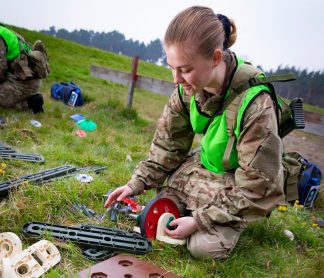7 Traps to avoid when facilitating experiential learning activities with young people
Facilitating experiential learning activities with young people presents some unique challenges and opportunities. What are the traps we should avoid? Many of these lessons are equally valid when working with adults.
Avoiding Conflict
1. Forming a team isn’t always plain sailing. When adults form teams there will often be a period of conflict after the initial pleasantries. This is a natural and healthy part of team development and leads to establishment of hierarchies and mutual understanding. It is important to give young people the freedom to go through this process, albeit monitored so it doesn’t get out of hand.
Stifling unhelpful behaviour
2. Let natural behaviours come to the fore be they ‘good’ or ‘bad’. All too often we as responsible adults stifle what we perceive will be ‘unhelpful’ behaviour before it has had an impact on the task. Only by letting the impact of many types of behaviour come to fruition can an individual realise the full implications of their actions. By stifling this ‘unhelpful’ behaviour we are removing the opportunity for peers to take action. And let’s face it a ‘badly’ behaved student is already told off every day. Will one more time really make a difference?
Joining the Team
3. A group is struggling and asks you a question; you walk over and offer a concise answer. The group asks you another question; you embellish a little and sure enough the group makes progress. The group is now successfully completing the task having used you to help with problem solving and the decision making. You feel good, because you’ve helped them over a sticky patch. One more question with the right answer from you and they’ll have finished… but….The problem is you’re now the group’s trusted advisor and leader, the problem solver, their crutch… Success is your responsibility not their achievement… Success with the task maybe, but what have they learned?
Keeping a reasonable physical distance from a group and remembering that any response should enhance learning helps maintain a healthy separation.
Correcting mistakes
4. Letting children make mistakes in a safe environment is a crucial part of learning. Some experiential tasks are very simple, some very challenging but an appropriately chosen task will be stretching for a given group of students. Experimentation and problem solving are crucial to the success of many experiential tasks, so children will suffer setbacks and relish breakthroughs along the way. This makes their final achievements all the more satisfying.
Focusing on the Negatives
5. Children must be allowed to make mistakes but we must also guard against focusing on negatives, failure and subsequent disillusionment. It is important to maintain and build self esteem throughout the learning process. Do this by drawing attention to successes in individuals’ approaches and help everyone understand how and why they happened. These successes can then be balanced by time taken identifying weaknesses and exploring areas for improvement.
Solving Problems
6. A group is struggling with the task and getting frustrated. No progress is being made and individuals are losing interest. You feel anxious: is it going to go wrong? Why not play safe and nudge the task along? Perhaps this sounds familiar? Far better to take some time out to help them identify what is going wrong and why. We must be careful not to solve issues for children but rather help them understand them and work through them for themselves. Every solution you offer is a missed learning opportunity. Why not impose; two minutes thinking time, running a facilitated group discussion or asking some probing questions and sit back? These simple techniques are often all it takes for a team to make break through, learn and get moving.
Imposing our Mindset
7. Children have fantastically creative minds and we have to challenge ourselves not to impose our own constrained preconceptions of ‘right’ and ‘wrong’ on the solutions they invent. It’s worth remembering that MTa use the same tasks to develop creativity with children and adults.
For more tips on facilitating read the rest of our expert guide series.
If you’d like more information about using MTa activities with young people please get in touch.

